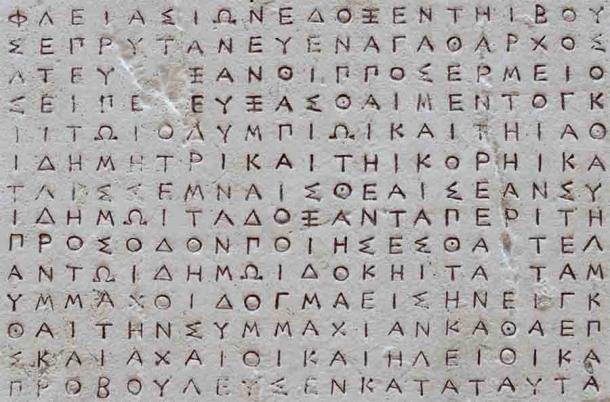Dyslexia is a disorder that can cause immense challenges for young people trying to learn how to read and write. In some instances, it can even affect the learning of mathematics or cause short-term memory problems . If left unaddressed, dyslexia can continue to cause complications in later life.
Current consensus suggests that dyslexia can be successfully managed, but not completely cured. Fascinatingly, some studies have found that learning the written language and alphabet of the Ancient Greeks can spur changes in brain development that help stave off the onset of dyslexia. And if the symptoms of dyslexia are already being experienced, learning the Ancient Greek alphabet can actually reduce their intensity or eliminate them altogether.
How Scholars Linked Dyslexia Treatment With Ancient Greek
Much of the knowledge about this area of dyslexia research comes from the work of two University of Toronto professors: Charles Lumsden, a biologist and associate of the university’s Department of Medicine and Medical Science, and the now-retired Derrick De Kerckhove, who was a professor of French and the one-time director of the university’s Marshall McLuhan Center of Communication Theory.
These scholars first became interested in the relationship between written language and cognition in the 1980s, and in 1988 they edited a book of essays on the subject called “ The Alphabet and the Brain .”
In more recent research , they address the subject of dyslexia specifically, reporting on studies that have connected the learning of Ancient Greek to the diminution of dyslexic symptoms.
“The benefits that result from the formation and proper use of the human brain have long been recognized by teachers and scholars from all around the world, who have suggested the systematic teaching of the Ancient Greek language as a treatment for dyslexic children,” they wrote.
“Dyslexic people might have difficulties in oral speech, spatial and temporal orientation, or right-left distinction,” they continued. “Of course, these difficulties, qualitatively and quantitatively, vary from person to person, and the symptoms vary according to age. When people are able to activate more parts of their brain thanks to the use of a language, they are likely to fight back some of the symptoms of dyslexia.”
Needless to say, few schools in English-speaking countries are teaching young people to speak, read, and write in ancient Greek. But it seems that reviving the language of the great philosophers and playwrights of the ancient world could offer substantial benefits to children who might otherwise be at risk for learning difficulties .

Even when modern children who don’t have dyslexia study the Ancient Greek language their verbal intelligence and deductive thinking is accelerated. (Raphael / Public domain )
Beyond Dyslexia: General Benefits Of Learning Ancient Greek
In Greece, a psychiatrist and psychotherapist named Ioannis Tsegos sponsored a study that tested the impact of the ancient Greek language and alphabet on 25 child learners between the ages of eight and 12. With as little as two hours of dedicated instruction in Ancient Greek per week, these children showed measurable, accelerated progress in the areas of verbal intelligence and deductive thinking.
In contrast, children in a control group who were not given instruction in Ancient Greek, but were taught the same subject matter using the same methodologies, did not demonstrate any acceleration in their pace of learning.
None of the students participating in this study were suffering from dyslexia. Nevertheless, the results of this research suggest that learning the written language of the Ancient Greeks can help prepare the mind for learning, in ways that give those who have such an exposure an advantage over those who don’t. This is believed to happen because learning the Ancient Greek alphabet activates areas of the brain that might otherwise lie dormant, which could increase learning efficiency in general even as it helps offset dyslexic tendencies.

Ancient Greek writing looks surprisingly foreign and yet it has proven to be of help with dyslexia. (Awe Inspiring Images / Adobe Stock)
How One Man Overcame Dyslexia With Ancient Greek
One study that directly established the capacity of Ancient Greek to combat the effects of dyslexia involved an adult subject.
In a 2006 article published in the journal Literacy, Australian researcher Kate Chanock from La Trobe University reported on her work with a male subject who had suffered from severe lifelong reading difficulties related to dyslexia. This individual was anxious to learn more about the philosophy and literature of the Ancient Greeks, and under Chanock’s guidance set about to learn the Ancient Greek alphabet and language.
After pursuing this endeavor for six months, he experienced noticeable improvement in his ability to read and comprehend English, which was an unexpected benefit of his pursuit of Ancient Greek knowledge. Even though he’d been suffering the effects of dyslexia for many years, this man still responded quite favorably to being introduced to a complex linguistic system that was in use more than 2,000 years ago!

There are surprising connections between writing and how we think. ( simona / Adobe Stock)
The Surprising Connection Between Writing And Thought
Derrick De Kerckhove’s initial interest in the subject of the Ancient Greek language’s effect on cognition and learning was sparked by a conversation with Marshall McLuhan, the famous Canadian philosopher and media theorist whose work inspired the creation of the center that De Kerchhove once directed.
Echoing the theories of well-known British classical scholar Eric Havelock, McLuhan explained to his protégé that the transition from oral to written philosophy in ancient Greece, which occurred primarily in the sixth through fourth centuries BC, may have spurred dramatic developments in the Greek theater.
The new emphasis on written language as opposed to oral transmission of complex ideas caused profound changes in Greek consciousness and psychology, the theory goes, making Greek tragedy a cultural response to an underlying psychological crisis among Greek thinkers and intellectuals.
In his work , Havelock focused on how the expanded use of the Ancient Greek alphabet and the written word impacted Greek philosophy, and most specifically the philosophy of Plato. He was convinced the impact was revolutionary, highlighting the immense power of the written word to affect perception of self and the world.
Havelock’s work remains controversial in academia. But the discovery that learning Ancient Greek can function as an antidote to dyslexia does land credence to the suggestion that the form of a written language can have a perceptible effect on conscious states.
In a sense, learning the language of the Ancient Greeks can at least in part bring that culture back to life, in a way that can have an actual impact on how learners perceive and relate to the world. Helping to reduce the intensity of dyslexic symptoms could be one such effect, but it may not be the only one.
Top image: Ancient Greek written into stone in Ephesus, Turkey ( Nikolai Sorokin / Adobe Stock)
By Nathan Falde
 RSS Feed
RSS Feed















 March 8th, 2021
March 8th, 2021  Awake Goy
Awake Goy  Posted in
Posted in  Tags:
Tags: 













